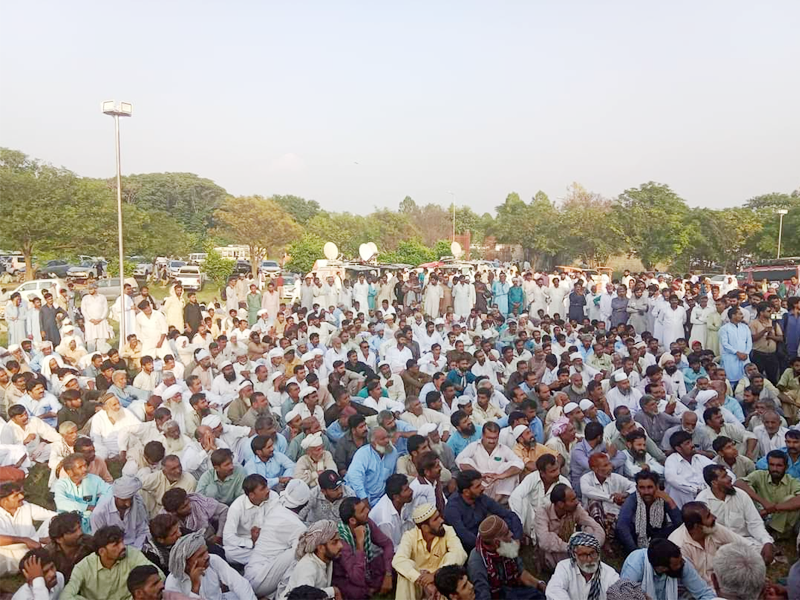Farmers’ demands need to be fulfilled

- 266
- 0
There is no denying that the recent floods have caused colossal damages to standing crops and agriculture sectors and our farmers are badly affected by the floods devastations.
As such their grievances must be solved on priority basis as agriculture is the backbone of our ailing economy. Last week, our farmers were on the roads and held a protest in Islamabad for pressing for their demands after the floods situation. They were mainly hailing from the Punjab province and their main demand was to restore the previous tubewell electricity tariff of Rs5.3 per unit and the removal of taxes and adjustments among other things. It is good to see that the government has agreed to their demands, including a delay and installments in payments of power bills and cancellation of fuel adjustment charges.
Meanwhile, it is also reported the prime minister will soon announce a package for farmers amid increasing pressure on our farming sector which reeling under the effects of ailing economy , high prices of fuel and the devasatations of floods. As a matter of fact our Agriculture sector is most affected by flash floods due to which the country is poised to get less crops yield this year and the food shortage and food inflation is going to persist rather aggravate in coming months. First drought and then flash floods, both wreaked havoc with our crops and their harvest mainly wheat, cotton and rice is going to be down massively this year.
The intensity of the disaster can be gauged from the fact that Sindh has already been declared "calamity-hit" where the wheat crop is going to be less by 30 per cent, while cotton has suffered 45 per cent losses, followed by dates 86 per cent and rice almost 40 per cent. Even the high water-consuming corps like the sugar-cane is badly affected by flash floods. This declining production patterns is going to result in more food shortage and food price inflation which is a matter of serious concern.
The extreme weather pattern i.e., first drought with no water to irrigate the fields and then torrential rains and flash floods within span of six to eight months speak volume of the climate change effects in our country which is basically an agrarian economy. In this backdrop, the crisis of food shortage is going to worsen in the country. Already the prices of essential kitchen items like onion, tomatoes, potatoes and other vegetables are beyond reach of the common man. Pakistan's current wheat production is projected to be less by more than thirty per cent for next year, posing a serious danger of further aggravating the food shortage issue in the country which is already reeling under the effects of the rupee's depreciation and inflation.
We have been noticing a marked decrease in cultivation area, high prices of fertilizers, and the water issues in the country and now with the flash floods, the situation is totally out of control. Some months back the country was facing a drought-like situation and experts said that water issues are serious because our country either does not have enough water to meet the irrigation needs or is faced with the danger of flash floods like the current situation due to which our standing crops are facing the danger of flash floods due to heavy deluges of water from the over flowing rivers and dams. It is pertinent to be mentioned here that the Pakistan Economic Survey (PES) 2021-22 has also pointed to the wheat and other food grains crisis in the country due to the low production of wheat and damage by flash floods for the next year. The wheat production forecast is said to be at around 27 million tonnes, which means 4.5% less production as compared to that of last year. The irony is that wheat is our staple food and sixty per cent of our food intake consists of wheat flour. On the other hand, our population has swelled to a record high which is evident from the fact that Pakistan has become the fifth most populous country in the world as compared to its earlier place i.e., the sixth most populated country before 2020. Last year, we had bumper wheat but even then it could not meet our food requirement and the government had to import wheat from abroad to feed its people. On the other hand, the rising food imports are also costing us highly in the international market as our import bill has been swelling by billions of rupees.
As reported, the government has been spending over $8bn on the import of food items every year to meet the requirement of food shortage. The import bill is set to soar again as government has to import 0.6m tonnes of sugar and 4m tonnes of wheat due to a shortage of these food items. It may be mentioned here that due to the rise in population, the consumption of food items is increasing while the production is not increasing at the same pace due to which there is a gap in the supply and demand of food items. And the government is compelled to import the same. In recent years, the import of sugar has increased by around fifty per cent while the import bill of wheat, edible oils, pulses, milk powder, tea, and spices is also growing rapidly.
The shortfall is going to further aggravate in the coming months as there is no long-term strategy in place. It ought to be mentioned with concerns that we lack adequate agri policies to address the concerns of farmers in the country. The high cost of farming in the country and adverse weather conditions are shying away farmers from growing more crops which is evident from less plantation of wheat and other food crops in 2021 in the country. The high diesel and fertilizers have made it difficult for farmers to meet the crop cultivation requirements which may not bode well for the country which is already faced with food shortages. According to a report by WFP, 43 per cent of people in our country are facing food shortages while 18 per cent actually suffer from insecure food situations.
Another report by the International Food Security Assessment by the US Department of Agriculture in the coming decade from 2021-31 reveals that an estimated 38 percent of Pakistan's population will suffer from food insecurity as our country is faced with the largest food gap in the whole region.
Meanwhile, a survey by World Food Programme says that almost 82 per cent of children in our country do not have access to a meal at times due to which the malnutrition rate of children in our country is the second-highest in the entire region. Sixteen percent of our children are said to be malnourished and due to food shortage, the situation will further aggravate.
Published in The Daily National Courier, October, 07 2022
Like Business on Facebook, follow @DailyNCourier on Twitter to stay informed and join in the conversation.

















































